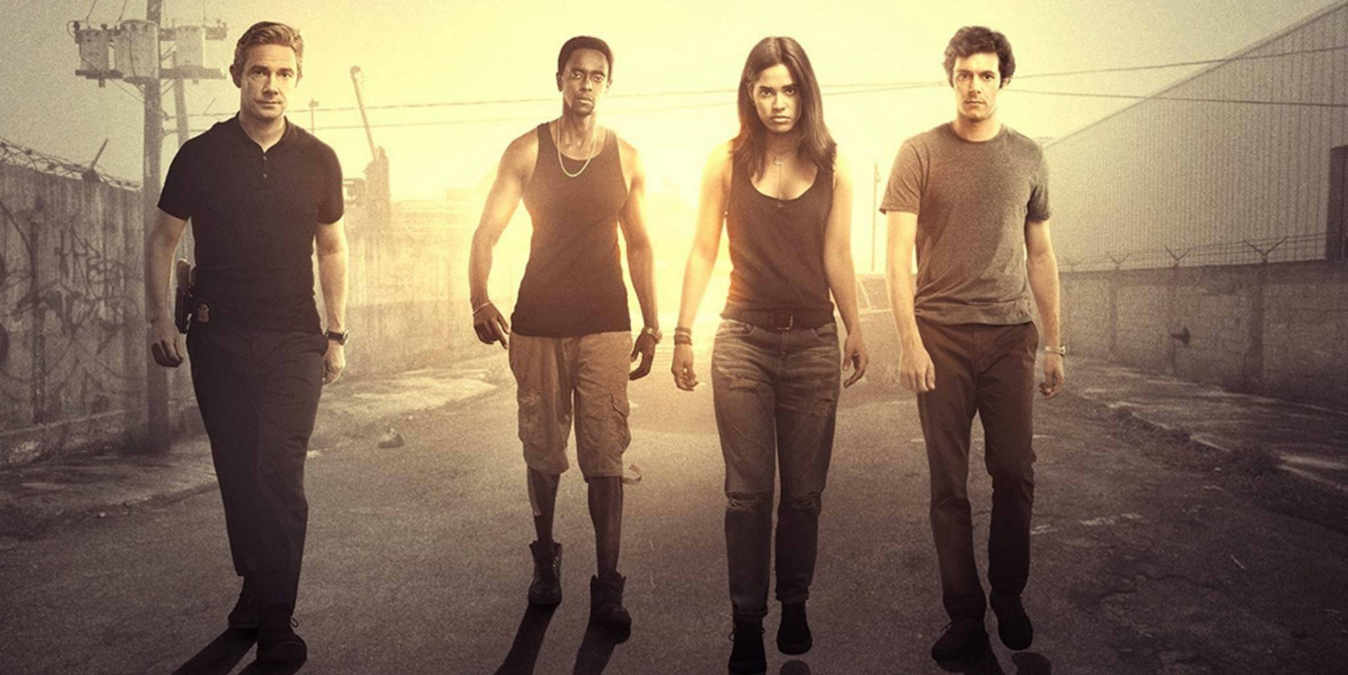
In Netflix top 10 recently as the premonitions keep cropping up
First, to be clear, this series was produced by Crackle (Originally Sony Crackle) and in-all 3 seasons were produced between 2016 (first premiered on September 6, 2016) and 2018. It stars Adam Brody, Edi Gathegi, Otmara Marrero, Martin Freeman, Ron Perlman, Addison Timlin, and Mira Sorvino.
On November 15, 2017, the series was renewed for a third season which was released on November 1, 2018. On May 4, 2021, all three seasons were made available on Netflix and surged up into the top ten in spite of the age.
The correspondences are loose, as is the connection between the subject matter and the real world analogs. The series is dramatic and emotional more than technical and the title “StartUp” is a bit meh. It conjures up images of Silicon Valley nerds and other tech bros and lame plots with outdated “dot-com” plot twists.
“StartUp” could not be further from any of that. Set in Miami (great first choice) it has the reputation of that city for money laundering, drugs and financial crimes as a backdrop.
Ultimately it’s about life and loss, the life and death struggle to find the “American Dream” and at the same time has connections to Crypto, Alt Coins, Web 3.0, The Dark Net, the criminal underworld, specifically financial crimes, Silk Road and, of course, tech start ups and venture capital.
The intertwining of this trio from disparate backgrounds is awkward but at the core of the story
It begins with “Izzy” Isabella Morales, who is a genus code crunching hacker who’s struggling to try to launch a crypto coin, “GenCoin” that she has been working on for over five years, since her time on scholarship at Stanford.
There’s not a lot of detail about her code and I don’t recall the term “blockchain” being mentioned, but they do mention bitcoin throughout the show and, considering it was around 2016 during production it is interesting to see where much of the plot fits 2021 far more.
A kind a linking character in the show is FBI agent, Phil Rask played by Martin Freeman who serves, wonderfully, to give exposition and a factual tour of the Miami crime scene and how he, and the FBI are swimming in a virtual ocean of corruption. If you can’t beat ‘em, join ‘em appears to be his motto as he is actively soliciting bribes from the jump.
Nick’s father, who is both well connected in the upscale world of financial corruption that operates openly within the big banks and corporations of the established Miami elite, is put into a jam by Agent Rask, forcing him to search for a fast escape from Miami.
Reluctantly, Nick is pulled into his father’s criminal dealings, the last thing he ever wanted, and as a result crosses paths both with FBI Agent Rask and, ultimately, invests in Izzy’s GenCoin project using his Dad’s dirty money. Once Izzy connects to Nick Talman (Adam Brody), the plot takes off.
Ronald Dacey who is a Haitian “gang leader” has a special, unique and unexpected role to play in the series. He is the human embodiment of the way the system favors the white collar criminals at the top, including the FBI, in this case, while the poor minority populations, epitomized by the tough Haitian ghetto in Miami, are forced into drug dealing and violent turf wars just to survive.
It turns out that Izzy, Nick and Ronald are not really that far removed from one another as they soon find out that a big chunk of the money Nick got from his Father turns out to belong to Ronald and his “gang”. The money was supposed to be laundered and managed by the bank where Nick’s father worked.
In an intense climax of the initial establishing episodes, the unlikely three, like a crypto-criminal Mod-squad end up as partners in the start up that they create to launch Izzy’s Gencoin.
GenCoin comes across as a kind of mini-Ethereum or alt-coin ahead of its time, and at the same time there is a dramatic interaction where the anti-government and grey-market potential and meaning of crypto is, albeit simplistically, superimposed on a critique of the social structures of the status quo.
Once again epitomized first by Miami corruption and criminal financial history as a way to underscore the desperate need, and also from the point of view of the show’s heroes, who decide to fight for a massive world changing digital transformation.
Though disconcerting at times, personal struggles and pain are superimposed over the passionate striving of the main characters
So, while all of this and the show in general, is dramatic with endless plot twists and great long-form character portrayals by the stars, particularly Ronald played by Edi Gathegi and Isabelle Morales played by Otmara Marrero, the correspondences that jump out during the show seem to emerge in strange and sometimes eerie ways.
For example, at one point they attend a huge “crypto convention” in Miami (first time in Miami after previously being held in LA) and, while they are not particularly successful in that instance, the size and stature of the show mirrors the conference that is happening literally as this article is being written (June 4-5, 2021) also in Miami (!).
While the BitCoin conference has been around since 2019, that year the number of attendees was only 1900 and is expected to be far more this year. While it is a coincidence that Miami was chosen in 2021 for the first time, it is a bit uncanny when watching a 5 year old episode where the exact conference is held in the exact location…
Another interesting corresondence has to do with events that transpire in the second and third seasons (spoiler alert). Through wild, dramatic twists and turns Gencoin is no longer the focus and the trio re-unite to launch a second tech project “Araknet” which is portrayed in the film as a kind of “dark-web 3.0 network”.
Interestingly, there are several very current projects that, while not directly a mirror of Araknet, have many of the same qualities and goals, though with less dramatic and sinister details. The biggest is that Dfinity and Internet Computer are trying to “extend”the current public internet network rather than launch a separate “private” Web 3.0 that has decentralized privacy at its core.
The DFINITY Foundation is a not-for-profit scientific research organization based in Zurich, Switzerland, that oversees research centers in Palo Alto, San Francisco, and Zurich, as well as teams in Japan, Germany, the UK, and across the United States. The Foundation’s mission is to build, promote, and maintain the Internet Computer.
One example is “Internet Computer” which is being developed by Dfinity, a start up in Switzerland. They are developing, in simplified terms a kind of blockchain based “internet 3.0” hence the cute catchy name.
Araknet promotional marketing from “StartUp” sounds again, bizarrely considering the time frame, like what you can read on the Dfinity web site today.
A slightly less direct correspondence is Helium. A project to crate a separate iOT network using long-range wireless nodes to create a decentralized wireless infrastructure.
The show emphasizes heavily the human drama and struggles of three special individuals as they try to find a path through a world of financial corruption, explosive technology changes and a disire to fight for freedom more so than individual wealth or power exclusively.
The show deserves its popularity and the attention it has been given. I would recommend it with the warning that the prophetic foreshadowing of today, while remarkable, is not the primary through-line of the narrative.
Related Articles:
- Apple near deal to produce film of Michael Lewis Book on Sam Bankman-Fried & FTX Collapse
- Ridley Scott to Produce ‘The Infinite Machine’ ETH Origin Story from Camila Russo’s Book
- Bitcoin’s Origins get Well-timed Mention in Elon Musk Tweet
- The Best Books on Cryptocurrency
- ‘Ethereum is Neutral, I Am Not’ Vitalik Buterin Calls Out Vladimir Putin: Glory to Ukraine
Find books on Music, Movies & Entertainment and many other topics at our sister site: Cherrybooks on Bookshop.org
Enjoy Lynxotic at Apple News on your iPhone, iPad or Mac.
Lynxotic may receive a small commission based on any purchases made by following links from this page
